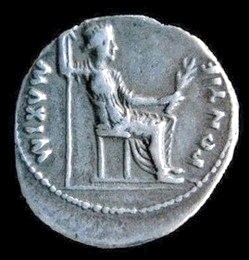

Livia Drusilla, daughter of Marcus Livius Drusus Claudianus, married Tiberius Claudius Nero in 43 BC. In 38 BC she had to divorce him and was then married to Octavian, the future Augustus. During the reign of Augustus, Livia, as empress manipulated people, managed her private interests, her wealth and the affairs of state. Under Augustus' will she was adopted into the gens Iulia, and renamed Iulia Augusta. Augustus' stern and very powerful consort not only had a clear grasp of imperial matters, but continued to exert her influence over her son Tiberius until her death in AD 29 at the age of 85 years. |
 |
Roman coinage depicting Livia is not common. She is not depicted on official Roman coinage during Augustus' lifetime, however, during the latter part of Augustus' reign, likenesses of the empress appear on provincial coinage of, for instance, Egypt and Palestine. Judean procurators dedicated their coins to her, as did Pontius Pilate. Coinage from this period often display on the reverse personifications with the attributes of either Pax, Iustitia or Pietas. These allegorical figures were often identified with Livia, whom Augustus had presented as a model of proper Roman womanhood. At the time Livia had become the most powerful, respected and feared woman in Rome and its provinces, and Tiberius began to strike coins with images of a seated female on the reverse of some bronze and silver issues. Livia is not named on Tiberius' coinage and scholars disagree on whether or not the depiction of the seated female refers to Livia. The denarius (above left) displays on the reverse the female figure of Pax, seated, with her feet on a footstool, holding a branch to designate peace, and a sceptre, an indication of imperial power. The legend reads PONTIF MAXIM in allusion to Tiberius who assumed the office of pontifex maximus, the chief priest of Rome, in AD 15. The coin was commonly associated with tribute tax and became known as the 'Tribute Penny' alluded to in Matthew 22.19, Mark 12.15, and Luke 22.24. The denarius on the right, struck under Galba, shows a deified Livia (her deification was carried out by her grandson Claudius) standing, holding a patera and leaning on a long sceptre, the honourific title reads DIVA AVGVSTA. The reverse type displays Galba's gratitude towards Livia, who had adopted him in his youth and had left him a substantial amount in her will. |